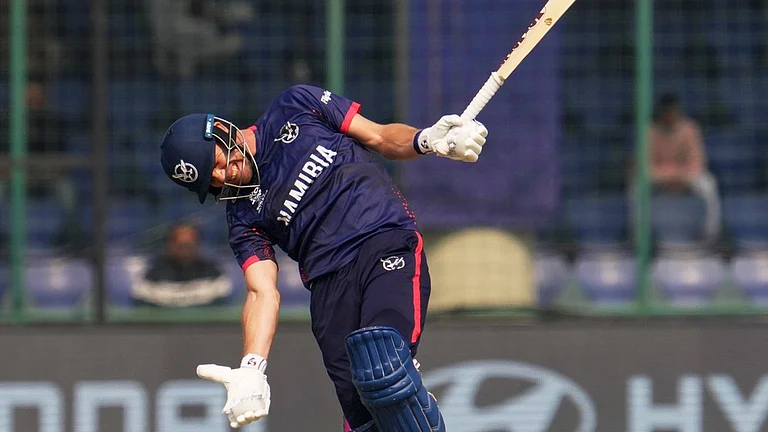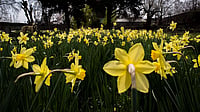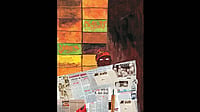Yaad-e-maazi azaab hai ya rab
Cheen lay mujhse hafiza mera
(Lord, the memory of the past
is a great torment.
Erase my every memory.)
On being asked whether I could write a piece on ‘Nostalgia’, I didn’t get the question at first, and couldn’t help but inquire “Nostalgia about what? Kashmir?” In my mind, nostalgia is associated with a piece I read as a child in a cricket magazine that began with: “Driving down the lanes of nostalgia, I recall….” It was evidently a word associated with fond memories and happy events of the past, as the columnist described his childhood romance with Test cricket that grew to be a lifelong passion. Thought of in this way, nostalgia seemed out of place as I could think of no such situation in my childhood that I could recall with fondness or joy.
Not that my childhood was particularly unhappy or sad on an individual level—my loving family spared no expense or effort to keep me happy. Their efforts, however, were thwarted by the times I grew up in, for I was born just before the infamous 1990s, when Kashmir descended into a maelstrom of trauma as militancy erupted in the Valley, consuming every semblance of order and sanity in its wake. The State responded with unprecedented militarisation to snuff out the revolt and restore its writ. The result: unmitigated chaos, bloodshed and mourning that refuse to relent three decades later. When I am asked to drive down the nostalgia lane, the events entrenched in memory are all imbued with a tinge of grief and disappointment. A confused medley of grieving, tears and loss.
The very first memories are of hearing that Rouf, a boy in the neighbourhood, had been shot dead while trying to cross over to his house from the one adjacent to it, through a window. I don’t recall who he was, but I vaguely remember a blood-coated shoe that was placed on the stairs of an outhouse in our compound. That image has haunted me for years.
A clearer memory is of watching from a window upstairs as a Sikh BSF jawan led our neighbour Mam-Koul through our lane at gunpoint. Apparently, they suspected militants were using his house as a hideout. Other memories are fragmented: Azadi slogans ringing out; processions I watched as a child, hearing with awe that the fabled Mushtaq Latram was to address the crowd; soldiers digging up the garden and stairs of a neighbour’s house as they believed militants had hidden arms there.
There is also a clear image of soldiers entering our house to search it. It puzzled me as my grandmother was paranoid about anyone coming in with dirty feet, and here was an entire group with boots on. They would leave the almirah upturned, its contents strewn on the floor. If children came into the house with dirty feet, or left clothes around in the room or on the bed, it would earn us a thrashing and a scolding from grandma. Yet, with the soldiers she seemed surprisingly demure and quiet. I would wonder what prevented her from rebuking the soldiers for violating her most cherished edict.
The mind also wanders to the umpteen chaharums I attended as a child, mostly of militants or other young men killed in firing or grenade blasts. Every other day a militant from the neighbourhood seemed to die, and there was tea on the day of chaharum. I remember it was salty with generous doses of butter dissolving in green sparkles. I recall one chaharum in which the fallen militant’s comrades came to the house and consoled the distraught mother that her son had done his tanzeem and people proud. It didn’t seem to cheer the mother or the mourners—death seemed no less traumatic.

Relics from Lost Paradise by artist Veer Munshi
There were other relics death left behind—bolted shops or closed windows. I remember hearing that Jan of Jan Pan House had been shot dead by a soldier who fired from the bunker opposite the shop. Jan was sitting in his shop when the bullet hit him. The shop stayed closed for years, and a bunker sprung up next to it. The shop’s bolted shutters and faded paint always induced sadness in my childhood heart whenever I passed by. Years later, long after we had moved out of the neighbourhood, I passed by the shop again, and was glad the bunker had been removed and a gleaming new shop had come up in place of the long-bolted shop.
I also recall going to get injections at Saebe’s medical shop at Shah Mohalla, or accompanying mother to get medicines for her or someone in the family, and listening to snippets of songs blaring from the nearby cassette shop—Attaullah Khan, filmy songs or Kashmiri songs. The Kashmiri songs would inevitably be plaintive numbers about militants and spoke of the pathos emerging from the militants being separated from their lovers, or the plight of their mothers and sisters. A snippet I remember ran like this (my mother would often sing it):
Auto walya auto walya che maa wuchtan Hilal
Auto walya auto walya che maa wuchthan Bilal
Reply: Na wuch main Hilal na wuchmai Bilal.
The song always left me saddened as I imagined the disappointment the mother or sister of Hilal or Bilal would feel. The other snippet I remember went like this:
Ta byoth huma sarhadan
Be ha chas wadan, myaani mashoqo.
I asked mother once about the song, and she said it was a mother singing about her son who had crossed the border for arms training, and had not returned. I would wonder what kept the sons away and why would they not return to their weeping mothers. No one seemed to have any clear answers.
Another memory is of my mom leaving in a huff to her parents’ home at Chanapora. It was Ramadan and I had been more difficult than usual and refused to do my homework despite her protestations. Tired from nursing my two-year-old sister Hirra, and angered by my refusal and lack of sympathy from my grandma, she decided to teach me a lesson. So, she hauled up Hirra and left for Chanapora when I left for the masjid for iftar. I returned with the usual bounty of dates for little Hirra, but was met by a silence in the kitchen on the dastarkhwaan. Father came from the masjid, and after hearing a report of the events was thrown into quite a temper. This was the straw that broke the camel’s back and I burst into tears. When I kept pleading to be taken to mother, turning a deaf ear to assertions that we won’t be allowed out in curfew, father had no choice but to take a risk. We had barely managed to walk up to Nawab Bazar bridge when we were stopped by soldiers who came out of a bunker. I remember pleading with the soldier that I want to go to mama, but he was unmoved. Finally, when he raised his heavy cane to strike us and let loose a torrent of expletives, I was frightened enough to be convinced to return, defeated and disappointed.
ALSO READ: Our Past In The Present
I was afraid I might meet the same fate as Noor-ul-Amin—a second cousin and my senior in school. After returning from school one day, he went out to buy sweets from the grocer. He had barely managed to buy the sweets when a grenade exploded in the market. Everyone lay flat on their stomach to take cover, but as the dust settled people realised he was not getting up. Apparently, his heart had been unable to bear the fear, and he suffered a cardiac arrest. I was eager not to die of too much fright.
However, my obstinacy showed up again a few days later when the Special Operations Group (SOG) detained a relative. Plans were afoot to meet him at the infamous ‘Cargo’ camp. Over morning tea, I insisted to be taken along, but everyone seemed offended by the request. When tears and entreaties failed, I emptied a kangri over my head and my horrified mother had to yield to my plea. I soon found out why they had not been keen to take me along. It was a poorly lit hall, filled with men with unkempt beards and dishevelled hair sitting on their haunches talking to visitors. Everyone spoke in low voices, but the buzz seemed to echo inside the gloomy walls and fear welled up again inside me.
ALSO READ: Fallen Earth And Divine Soil
Another gloomy memory is of a soldier punishing the driver of our school bus, Billu Bhaiya—a green-eyed boy in his early 20s, with luxurious hair that fell over his face. He drove a green Tempo Matador and I loved sitting in the front cabin. One day after school, we were passing by a BSF camp when the sentry beckoned the vehicle to stop. Billu Bhaiya was a tad late to apply the brakes, and the soldier was miffed. I see him clearly in the mind’s eye—a tall strapping fellow in a crisp uniform with a long white turban and long boots. As he spoke in a low intimidating voice, every feature on his face convulsed in anger. A few cursory slaps, and then he noticed the neatly combed hair. He grabbed and pulled it hard, landing kicks generously all the way. Billu Bhaiya kept his head bowed and the soldier let him go after punishing him to his heart’s content. We were furious but afraid. When Billu Bhaiya limped back to the bus, I saw tears in his eyes. I wondered why Billu Bhaiya never reacted or why the soldier was so angered by a small ‘mistake’. No one had any answers.
Once, however, my parents did have an answer to my queries—when a dentist was shot dead. Coming home from school one day, I found both my parents in tears, and my mother cursing. She pulled me closer and hugged me tightly. A couple of days ago, when I had a bad toothache, I had been taken to a dentist at Nawakadal. We walked through a maze of narrow lanes, avoiding the main road due to the curfew. The dentist was an elderly man with greying hair and a kind smile. Mother was cursing the dentist’s killers: “May your arms wither, may you suffer palsy.” I asked mother who had killed him. She replied: “Militants.” This surprised me. I couldn’t understand why militants would kill an elderly dentist. I had heard they were pious boys who ran the tehreek (movement). So I asked mother why the militants shot him dead. She replied: “Because he was a Batta”—a Kashmiri Pandit. I knew who Battas were because she spoke fondly of her Batta neighbours—Pinku ji and Kaka ji, sons of Makhan Lal who were her childhood friends but had left for Jammu now. From all accounts, they appeared to be young, jovial fellows and why anyone would harm people like them was beyond me. I was, therefore, left none the wiser with mother’s reply and, like many other questions, this one too has been left unanswered till date.
(This appeared in the print edition as "A Nostalgist’s Map of Kashmir")
(Views are personal)
ALSO READ
Huzaifa Pandit is author of Green is the Colour of Memory and teaches literature at Islamic University of Science and Technology, Awantipora, Kashmir


























